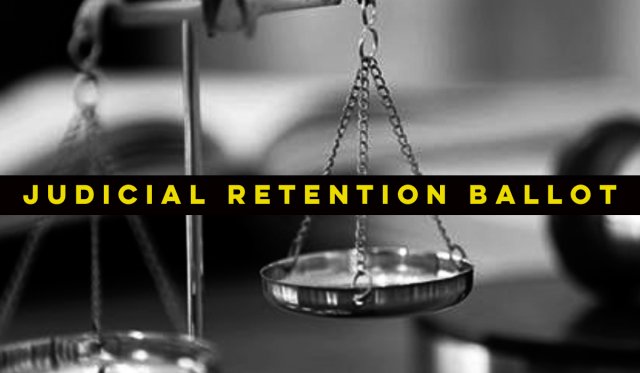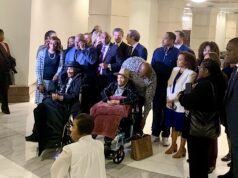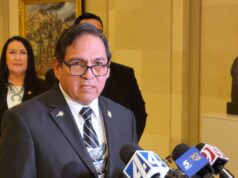
Voters this election will see the names of eight Oklahoma judges on their ballots who are up for retention.
Oklahoma has three appellate courts — the Supreme Court, the Court of Civil Appeals and the Court of Criminal Appeals. The Supreme Court and the Court of Criminal Appeals are the state’s courts of last resort for civil and criminal matters, respectively. (This is a fairly unusual setup; most states have only one court of last resort.)
Judges are appointed to these three courts by the governor, selected from a list of nominees compiled by the Oklahoma Judicial Nominating Commission. Though the judges never have to run for election and don’t campaign, they are up for retention every six years, meaning the voters of Oklahoma decide whether they keep their jobs or not. So far, no Oklahoma judge has ever been denied retention in an election.
The following profiles of the judges on this year’s ballot are derived from publicly available information. A good resource for more information on Oklahoma courts and the retention system is courtfacts.org, a nonpartisan guide compiled by the Oklahoma Bar Association.
Supreme Court
The Oklahoma Supreme Court is the state’s highest court in matters regarding civil law and the Oklahoma Constitution. It also sets the rules governing the rest of the state’s judicial system. This year, three justices are up for retention.
Supreme Court District 1 — M. John Kane IV
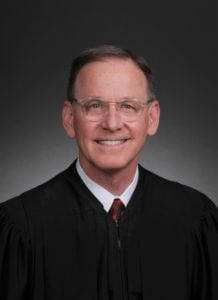
Justice M. John Kane IV joined the Oklahoma Supreme Court in September 2019 after serving 14 years as a district judge for Oklahoma’s 10th Judicial District in Osage County. Kane was Gov. Kevin Stitt’s first Supreme Court appointee, filling a seat left open by the retirement of Justice John F. Reif. (Kane is up for retention this year because he was appointed partway through a term.)
Kane is a lifelong resident of Osage County. His father and grandfather were both lawyers, and his great-grandfather was a framer of the Oklahoma Constitution.
When Kane was appointed, Gentner Drummond, a former candidate for attorney general who practices law in Osage County, called him “fair to a fault, a strict constitutionalist and equally empathetic to the business person and the homeless person.”
Kane is Catholic and received support from pro-life groups after his appointment was announced.
He dissented on two notable Supreme Court decisions this year, including The League of Women Voters of Oklahoma v. Ziriax, which functionally loosened the notary requirement for absentee voting.
“The issues stand presented to the wrong branch of government,” he wrote in that case.
He was the sole dissent in Treat v. Stitt, which found that the governor did not have authority to enter into new gaming compacts with the Comanche Nation and Otoe-Missouria Tribes. He dissented because the tribal nations were not party to the suit.
“The Comanche Nation and Otoe-Missouria Tribes are indispensable parties to this action,” he wrote. “I would dismiss the case for lack of indispensable parties.”
Supreme Court District 6 — Tom Colbert
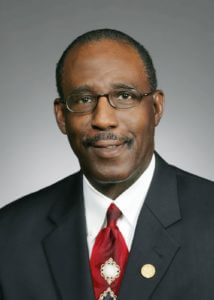
Justice Tom Colbert was appointed to the Supreme Court in 2004 by Gov. Brad Henry. He is the first African American to serve on the court. Previously, he was also the first African American to sit on the Oklahoma Court of Civil Appeals, where he served from 2000-2004.
Colbert graduated high school in Sapulpa in 1970, earned his undergraduate degree at Kentucky State University and went on to serve in the U.S. Army. He earned a master’s in education from Eastern Kentucky University in 1976 and then taught public school in Chicago before attending law school at the University of Oklahoma, where he graduated in 1982.
In 2013, Colbert became the court’s first Black chief justice. (The court picks a new chief justice from among the sitting members every two years.) At his induction ceremony, he said he had twice considered resigning — once for private practice and once to be considered for a federal judgeship — but his wife and mother had convinced him to stay because his position on the court was important for other Black people.
“Here I am on the doorstep of making it to the next level, and it would be very selfish for me to worry about my own opportunities when someone else may never get the opportunity to stand where I’m standing, being a minority,” he said.
Colbert is a competitive runner and was named an All-American for the long jump in college.
He was one of two dissenters in a high-profile 2015 decision that resulted in the removal of a monument displaying the Ten Commandments from Capitol grounds.
Supreme Court District 9 — Richard Darby
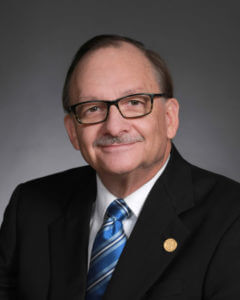
Justice Richard Darby was appointed to the Supreme Court by Gov. Mary Fallin in 2018 and is the only Fallin appointee still sitting on the Court. He previously spent 23 years as a judge for the Third Judicial District, in southwest Oklahoma.
His family members are the Darbys behind Darbys’ Big Furniture, and the justice worked in the store as a child, according to his official biography. He received his undergraduate degree from Southwestern Oklahoma State University and his law degree from OU.
Darby practiced law in Altus before becoming a judge. Darby also serves on the appellate division of the Oklahoma Court on the Judiciary.
Along with Kane, Darby dissented from the Court’s 2019 decision to grant an injunction that barred the enforcement of a law banning certain second-trimester abortions.
Court of Criminal Appeals
Just as the Supreme Court is the Oklahoma’s highest body in civil matters, the Court of Criminal Appeals is the state’s final authority in criminal cases. Five judges serve on the court and two are currently up for retention.
Court of Criminal Appeals District 2 — Robert L. Hudson
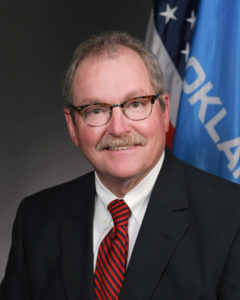
Judge Robert L. Hudson was appointed by former Gov. Mary Fallin in 2015. He is originally from Guthrie and studied agricultural economics and accounting at OSU before earning his law degree from the OU College of Law in 1983.
He went into private practice in Guthrie and then served as district attorney for Payne and Logan Counties from 1996 to 2011. In that role, he helped establish Oklahoma’s first drug court.
Hudson then spent a year as the first assistant attorney general before becoming a special judge in the Ninth District from 2012 until his appointment to the Court of Criminal Appeals.
At the time of his appointment, Fallin said, “As a prosecutor, he has been both ‘tough on crime’ and ‘smart on crime.’”
Outside the court, he runs a farm and ranch outside Guthrie and served as a commissioner for the Oklahoma State Bureau of Investigation for almost 10 years.
Court of Criminal Appeals District 3 — Gary L. Lumpkin
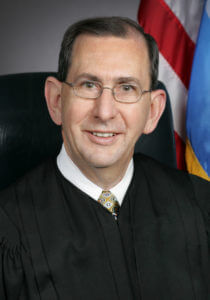
Judge Gary L. Lumpkin is originally from Sentinel and earned a bachelor’s degree in business administration from Southwestern Oklahoma State College, in Weatherford, in 1968. He has served on the Court of Criminal Appeals since 1989 and was appointed by Gov. Henry Bellmon.
After college, Lumpkin went on to serve in the U.S. Marine Corps from 1968-1971, including 18 months in Vietnam. After his active service, he remained in the Marine Corps Reserve until 1998 and served on the Navy-Marine Corps Court of Criminal Appeals.
Lumpkin graduated from the OU College of Law in 1974. His civilian law career included time as a staff attorney at the Oklahoma Department of Consumer Affairs and work in the nonprofit sector. He became a district attorney in Marshall County in 1976. Before his appointment to the court, he served as an associate district judge in Marshall County and as a district judge for the 20th Judicial District, Division II.
According to a 1990 piece in the Tulsa World, Lumpkin “was one of the first jurists in Oklahoma to sentence non-violent offenders to work for non-profit agencies, county governments and school boards.”
In 2017, Judge David Lewis, the court’s sole Black judge, criticized Lumpkin for issuing an opinion in a murder case which repeatedly quoted the defendant’s use of a racial slur. (Hudson, who is also up for retention, defended Lumpkin, writing that there was “nothing unusual, let alone gratuitous” in Lumpkin’s use of the verbatim quotations.)
Court of Civil Appeals
Oklahoma’s Court of Civil Appeals is the second-highest civil court in the state, after the Supreme Court. Though its decisions can be appealed to the Supreme Court, the Court of Civil Appeals is responsible for most of the state’s final decisions in civil cases. The Court is composed of 12 judges, who are divided among four districts with three judges per district. Three judges are up for retention in this election.
Court of Civil Appeals District 1, Office 2 — Jane P. Wiseman
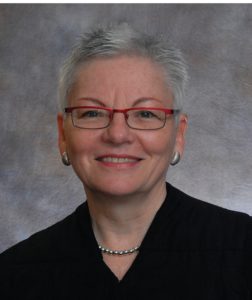
Judge Jane P. Wiseman was appointed to the Court of Civil Appeals by former Gov. Brad Henry in 2005. She attended Cornell University as an undergraduate and earned a graduate degree in American history from the University of North Carolina at Chapel Hill before attending law school at the University of Tulsa.
Wiseman became a district judge in 1981, appointed by Gov. George Nigh, serving in the family relations division and then in the civil division.
In addition to her judicial duties, Wiseman serves on the education and diversity committees for the Oklahoma Judicial Conference. She has also previously taught at the National Judicial College.
Wiseman performed the marriage ceremony between Sharon Baldwin and Mary Bishop, the first same-sex couple to get married in Oklahoma.
Court of Civil Appeals District 2, Office 1 — Deborah B. Barnes
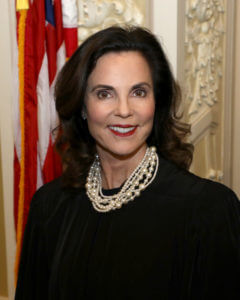
A native of Tulsa, Judge Deborah B. Barnes studied public relations at OU before receiving her J.D. from Oklahoma City University School of Law in 1983. She was appointed to the Court of Civil Appeals by Gov. Brad Henry in 2008.
Before her appointment, she worked in education, spent time in private law practice and served as a staff attorney for Oklahoma Supreme Court Justice Ralph Hodges. She went on to serve as a vice president at the natural gas company Transok and then as vice president, secretary and associate general counsel at ONEOk, also a natural gas company.
Barnes was one of three judges nominated for a spot on the Supreme Court in 2019, for the seat that ultimately went to Justice M. John Kane.
Court of Civil Appeals District 2, Office 2 — W. Keith Rapp
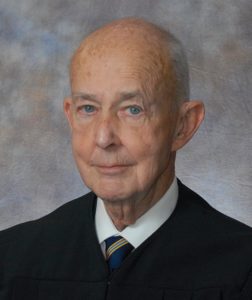
Judge W. Keith Rapp has been on the Court of Civil Appeals since 1984, appointed by Gov. George Nigh. His J.D. is from the University of Tulsa and his undergraduate degree is from Southwest Missouri University. He also holds a master’s degree in law from the University of Virginia.
Rapp had an unconventional path. Before attending law school, he started his career as an aerospace engineer and worked on the Mercury, Apollo, Lunar Lander and Skylab projects at NASA. He served two tours in the Navy and has worked in the banking and insurance industries.
Before becoming a judge, Rapp was a public defender in the 14th Judicial District and a prosecutor in Broken Arrow. He served as a municipal judge in Bixby then as an alternative municipal judge in Tulsa before becoming a district court judge, where he served until his appointment to the Court of Civil Appeals.








